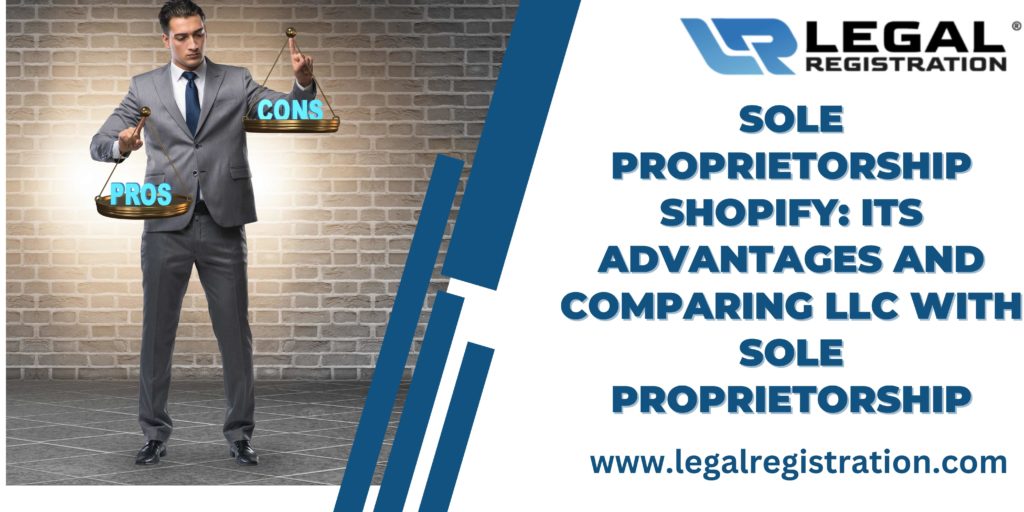Sole Proprietorship Shopify: Its Advantages and Comparing LLC with Sole Proprietorship


Can you sell on Shopify without LLC?
A single-owner, unincorporated business is referred to as a sole proprietorship. In this case, there is no legal separation between the company and you. That implies that you are accountable for every part of the company, including obligations, losses, and debts. In other words, the firm owner is personally liable indefinitely. An individual who files a lawsuit against a lone proprietor may be able to seize both the company’s assets and the owner’s personal assets. Through LegalRegistration.com, you can form an LLC in no time.
What benefits do sole proprietorships offer?
A sole proprietorship has numerous benefits when determining the kind of company structure that works best for you, not the least of which is that they are easy and inexpensive to set up.
Simple to form
Since no official action is necessary to establish a sole proprietorship, you can save the time and money you would otherwise spend fulfilling legal procedures particular to other business structures, including LLCs. If you have not investigated additional avenues for incorporation, your company is immediately regarded as a sole proprietorship.
Absolute control
As a sole proprietor, the owner runs the company alone and doesn’t require input from anybody else as they would in a partnership. Owners may even choose to pass their company on to certain heirs. For more information visit the website LabyrinthTM Fundraising Compliance
No payments of business taxes
Sole proprietorships require the owner to pay only personal income taxes on the profits rather than corporate employment taxes like a huge corporation.
Affordable to establish
While sole owners must adhere to licensing regulations set forth by the states in which they operate (if their line of activity necessitates a license), other paperwork and formalities are considerably less onerous for sole proprietors than for corporations. As a result, it is less expensive to launch a firm. Please give LegalRegistration.com a phone call if you need more information.
Can You Sell on Shopify without LLC?
You’re constantly looking for methods to optimize your operations and cut costs as an owner of an e-commerce business. Selling without creating an LLC on Shopify is one way to achieve this. But is it actually feasible?
You can sell on Shopify without forming an LLC, so the answer is yes. However, there are a few things you should keep in mind, though. You must first confirm that your company is set up as a sole proprietorship or partnership. The second step is acquiring all the licenses and permits needed to run your firm. Thirdly, you must confirm that you have sufficient liability insurance. Get more information Sole Proprietor
Comparison of sole Proprietorship vs. LLC
When choosing between Shopify LLC or sole proprietorship, you need to look at the core differences between both scenarios. Consider the following:
Taxes
You must declare your business revenue and costs on your personal income tax returns regardless of whether you are a sole proprietor or the manager of a single-member LLC (if the LLC did not make any special tax elections). Therefore, while choosing between a sole proprietorship and a single-member LLC, a business owner may discover that there are no significant income tax repercussions. For additional information What services do we provide?
Liability
One of the key advantages of this business structure is that LLCs often offer greater personal liability protection than sole proprietorships. Whereas, a sole proprietorship puts all of your personal assets at risk if the company goes into debt.
Costs
Since there is no formal procedure or documentation required, a single proprietorship may be less expensive to start than an LLC. Some sole proprietors may decide to register a Doing Business As (DBA) trade name even if it is not necessary. Owners of sole proprietorships Shopify and Shopify LLCs must both research local business operating laws and secure any appropriate licenses or permits. Check out the article Hit & Run
How to Make Each Structure Active for Your Company
You must submit articles of organization, also known as a certificate of organization, to the state in order to create an LLC. By state, requirements change. Usually, the rights and responsibilities of the members and management are laid forth in an LLC operating agreement.
A filing fee that can vary from $50 to $500 must also be paid when you submit certain paperwork to your state office, which is often the Secretary of State. In most states, LLCs must also submit yearly or recurring reports and pay a filing fee. Contrary to an LLC, if you are operating under your own name, no legal activity is necessary to establish a sole proprietorship. You must submit a DBA application if you wish to use a different name.
Additionally, you might need to get any necessary licenses or permissions, which differ by state, location, and industry. Now that you have the information necessary to make a better-educated choice for your company and your future, you may choose between a sole proprietorship and an LLC, which both offer liability protection and flexibility.
Only LLCs are able to select a corporate tax status
Tax flexibility is a significant distinction between LLCs and sole proprietorships. Only LLC owners have the option to decide how their company will be taxed. They can choose to tax the LLC as an S-corporation or C-corporation, or they can continue with the default—pass-through taxes. A pass-through entity is an S-corporation. The LLC will be required to pay federal corporate income tax if it is taxed as a C-corporation (most states and some localities also levy corporate taxes). For additional information Category
LLCs occasionally benefit financially from choosing the corporation tax status. Dividends from the firm are often taxed at a lower rate than regular business income when a company is taxed as a corporation. Additionally, retained earnings in a corporation are not taxed. In contrast, LLC members cannot classify income as dividends and are required to pay taxes on all corporate profits, whether or not they are reinvested in the firm. Additionally, a business is entitled to extra tax breaks and credits.
Legal protection for solo proprietorship versus an LLC
A sole proprietorship has no formal distinction between the owner and the company. The obligations of the company are personally owed by the owner. If the business fails, the sole proprietor is required to file for personal bankruptcy; the bankruptcy process will take into account both personal and commercial obligations. Additionally, if a sole proprietorship is sued, the owner may be personally named in the litigation and their own assets may be at stake.
Creating an LLC is among the finest methods to safeguard your personal assets. The owner isn’t held personally responsible for the liabilities of the firm because an LLC is a legally distinct entity from them. The proprietors don’t have to pay the company’s creditors out of their own wallets if they file for bankruptcy if the firm collapses. A person who sues an LLC cannot, with few limitations, sue the owners directly. Of course, proprietors of an LLC might be charged with fraud, carelessness, or obligations for which they personally guaranteed payment. There is no type of business structure that completely shields owners from business-related obligations. Additional information Business Licensing
Paperwork and compliance in an LLC vs. a sole proprietorship
The last distinction between a sole proprietorship and an LLC relates to documentation and regulatory demands. A sole proprietorship requires the least amount of documentation prior to starting, as was already explained. A lone owner is only required to file federal, state, and local taxes after the business has begun. A solo proprietor may also need to renew company licenses. Get more information Legal Registration Archives
An LLC is subject to greater regulatory requirements. After submitting their first articles of formation, LLCs are required by several states to submit an annual report. An LLC with numerous members is subject to even additional obligations, including the need to create an operating agreement, issue membership units, document ownership transfers, and convene member meetings. All of these actions are strongly advised for LLCs to maintain member liability protection even if they are not legally necessary. Additionally, because an LLC is a recognized business organization, it requires more paperwork to dissolve an LLC.


